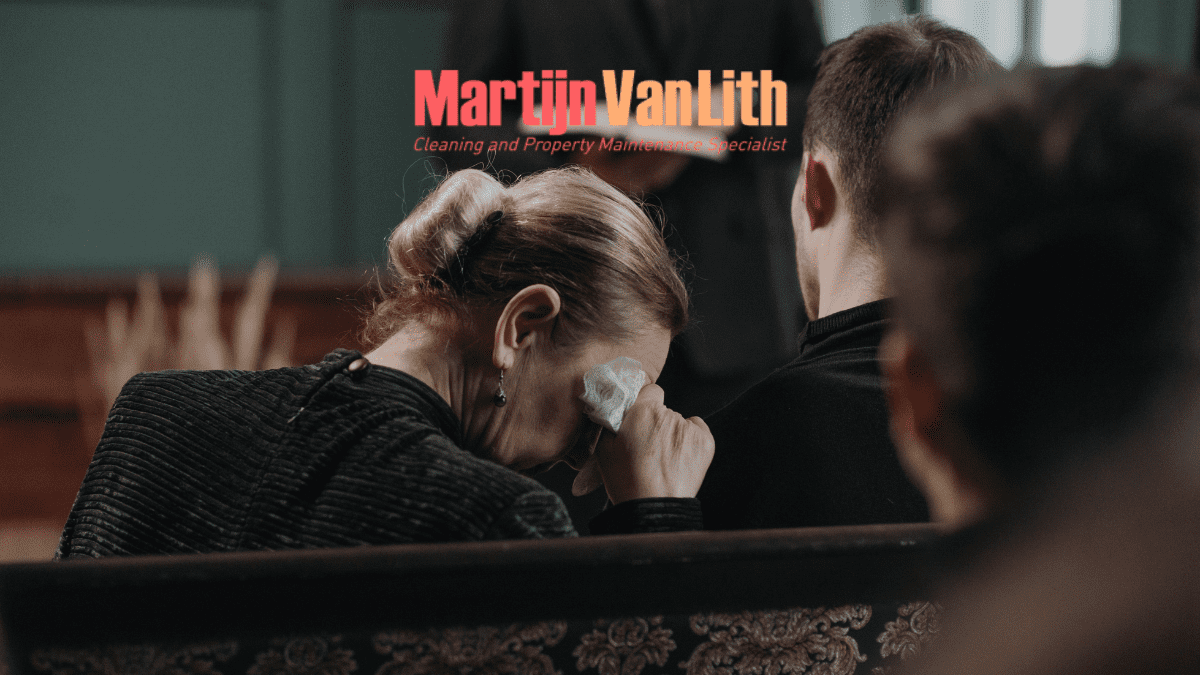Understanding the Emotional Toll of Deceased Estate Clean Up
Losing a loved one is a difficult experience, and the task of cleaning up their estate can add another layer of emotional and logistical strain. During this challenging time, it’s important to remember that you don’t have to go through it alone. Martijn van Lith specializes in providing professional, compassionate, and comprehensive deceased estate clean up services across Southeast Queensland.
Getting Started: Initial Steps After a Loved One’s Passing
In the emotionally difficult period following a loved one’s death, there are essential tasks to be tackled to manage their affairs and secure their property:
- Secure the Property:
- Change the locks to ensure security.
- Make sure the premises are safe.
- Organize Important Documents:
- Find the will, insurance policies, bank statements, etc.
- Arrange these documents in an orderly system for easy access.
- Notify Relevant Entities:
- Inform banks, insurance companies, and government agencies about the death.
- Redirect mail and cancel any subscriptions or services not needed anymore.
Remember, dealing with the initial steps after a loved one’s passing can be emotionally taxing. It’s perfectly normal to feel overwhelmed or unsure of where to begin. Don’t hesitate to seek support from family, friends, or professionals if needed. Taking these initial steps will help lay the foundation for a smoother and more organized estate clean-up process.
Sorting Through Personal Belongings
One of the most emotionally taxing aspects of a deceased estate clean-up is sorting through the personal belongings of your loved one. This process can be overwhelming, as you’re confronted with a lifetime’s worth of possessions, each item potentially carrying sentimental value or cherished memories.
To make this process more manageable, it’s essential to categorize items into four distinct groups: keep, donate, sell, and dispose. Begin by setting up designated areas or containers for each category, making it easier to sort items as you go.
Categorizing Items
“Keep” Category – For items you or other family members wish to retain, such as family heirlooms, sentimental keepsakes, or valuable personal possessions. Be selective with this category, as keeping too many items can make the process more difficult and prolong the emotional attachment.
“Donate” Category – for gently used items that can be given to charitable organizations or thrift stores. This includes clothing, household goods, books, and other items that are still in good condition but no longer needed.
“Sell” Category – For valuable items that can be sold, such as antiques, collectibles, jewelry, or high-end electronics. These items may require professional appraisals to determine their value.
“Dispose” Category – For items that are broken, damaged, or have no practical or sentimental value. These items can be responsibly discarded or recycled.
Involving Family Members
The process of sorting through personal belongings can be emotionally charged, and it’s essential to involve other family members or close friends. Encourage open communication and respect each person’s emotional connection to certain items. Consider creating a rotating schedule or assigning specific areas to different individuals to share the emotional burden.
Handling Sentimental Items
Sentimental items can be particularly challenging to sort through, as they often hold deep emotional significance. When encountering such items, take a moment to reflect on the memories and emotions they evoke. Consider creating a memory box or album to preserve these special items or their associated stories.
If you’re struggling to part with sentimental items, it can be helpful to seek the perspective of a neutral third party or a professional organizer. They can provide an objective viewpoint and guide you through the process of determining which items truly hold lasting value.
Remember, the goal is not to erase the memory of your loved one but to honor their legacy while creating a sense of closure and moving forward in a healthy manner.
Professional Appraisals and Liquidation
When sorting your loved one’s belongings, get professional appraisals for potentially valuable items like antiques, collectibles, jewelry, and artwork. Appraisers can help you make informed decisions about keeping, selling, or donating these items. If you decide to sell, consider hiring an estate liquidator who can handle the entire process efficiently and maximize the value of the items.
When it comes to selling valuable items, you have several options to consider:
-
Auction Houses: Reputable auction houses can be an excellent choice for selling high-value items, such as fine art, antiques, and collectibles. They have a vast network of buyers and can generate competitive bidding, often resulting in higher sale prices.
-
Online Marketplaces: Online platforms like eBay, Etsy, and specialized marketplaces can be effective for selling a wide range of items, from jewelry and collectibles to furniture and household goods. These platforms offer a global reach and can be convenient for selling smaller or more accessible items.
-
Consignment Shops: Consignment shops can be a good option for selling gently used furniture, clothing, and accessories. They take a commission on the sale, but they handle the marketing, pricing, and sale process for you.
-
Estate Sales: Hosting an on-site estate sale can be an efficient way to sell a large volume of items, including furniture, household goods, and personal belongings. Estate liquidators can organize and manage these sales, ensuring a smooth and successful event.
Remember, the process of appraising and selling valuable items can be complex and time-consuming. Working with professionals who have the expertise and resources to handle these tasks can alleviate stress and ensure that you receive fair value for your loved one’s possessions.
Donating and Recycling Unclaimed Items
Unwanted items from a deceased estate can be responsibly disposed of through donation and recycling. Many charities and organizations accept gently used items, while recycling programs can handle a variety of materials, including electronics, appliances, and hazardous waste. By choosing these options, you reduce waste and give new life to unwanted items.
Deep Cleaning and Property Maintenance
Once the belongings have been sorted, it’s essential to thoroughly clean the property. This can include deep cleaning carpets, floors, and appliances, as well as addressing any specific cleaning needs, such as hoarding situations. Hiring professional cleaning services can ensure a thorough and efficient clean.
Emotional Support and Grief Resources
The process of cleaning out a deceased loved one’s estate can be emotionally draining and overwhelming. It’s important to prioritize your mental health and seek support during this difficult time. Here are some resources to help you manage grief and find emotional support:
Managing Grief During the Process
Grief is a natural and complex emotion that can manifest in different ways. As you sort through your loved one’s belongings, you may experience a range of emotions, from sadness and anger to guilt and longing. Allow yourself to feel these emotions without judgment, and don’t hesitate to take breaks when needed.
It’s also important to involve other family members in the process, as sharing memories and supporting each other can help in the healing process. Consider creating a memory box or photo album to preserve cherished items and honor your loved one’s legacy.
Support Groups and Counseling
Joining a grief support group can provide a safe and understanding environment where you can share your experiences and connect with others going through similar situations. Many local communities, religious organizations, and hospitals offer grief support groups led by trained professionals.
Individual counseling or therapy can also be beneficial, especially if you’re struggling with complicated or prolonged grief. A qualified therapist can help you work through your emotions, develop coping strategies, and provide guidance on navigating the grieving process.
Self-Care Tips
Taking care of yourself is crucial during this emotional period. Make sure to prioritize self-care activities that bring you comfort and relaxation, such as:
- Engaging in physical exercise or outdoor activities
- Practicing mindfulness or meditation
- Journaling or creative expression
- Spending time with supportive friends and family
- Maintaining a healthy diet and sleep routine
Remember, grief is a personal journey, and there is no right or wrong way to experience it. Be patient and compassionate with yourself, and don’t hesitate to seek professional help if you’re struggling to cope.
Martijn van Lith: Your Trusted Deceased Estate Clean Up Partner
Martijn van Lith offers compassionate and professional deceased estate clean-up services in Southeast Queensland. Our team understands the sensitive nature of this process and will work diligently to ensure a smooth and stress-free experience for you and your family. We are experienced in handling various situations, from sorting through personal belongings to deep cleaning and property maintenance.
Our clients consistently praise us for our compassion, efficiency, and attention to detail. We strive to exceed your expectations and provide the support you need during this difficult time.
Conclusion
We understand that every situation is unique, and we’ll work closely with you to create a customized plan that meets your specific needs. Trust Martijn van Lith to handle your deceased estate clean up with the utmost care and professionalism.
Cleaning up a deceased estate is a significant undertaking, but with the right support, it can be manageable. Martijn van Lith is here to help you through every step of the process, from sorting through belongings to deep cleaning and emotional support.
If you’re in Southeast Queensland and need assistance with a deceased estate clean up, please don’t hesitate to contact Martijn van Lith for a consultation.
Remember, you’re not alone.
Contact Martijn van Lith today and let us take care of the details while you focus on healing.
Martijn van Lith offers professional, ethical, and confidential extreme decluttering/cleaning services. Why choose us? Because we understand our clients very well, we go beyond just doing the job- we build relationships with our clients, and we treat your possessions with caution and care. We’ve helped over 5000 clients in the past, and we’ve been featured in the news, as well. Our loyal customers can attest to the quality of our services. Check out their testimonials here.







 (c) Property of Martijn van Lith
(c) Property of Martijn van Lith